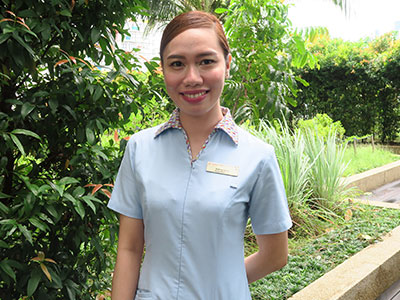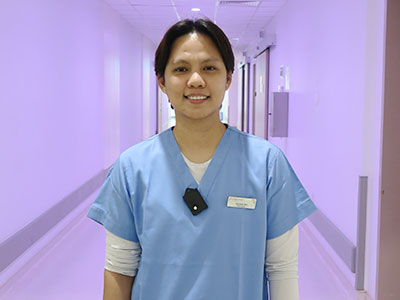
It was not long ago that Katrina Apolinar Chan, Senior Staff Nurse (SSN) at Inpatient Suite (IPS) 9, remembered the scramble to transition one of the hospital’s inpatient suites to care for COVID-19 patients. According to her, it was a totally new experience from her previous training and encounter specialized in cancer and geriatric nursing.
From reviewing the multidisciplinary IPS 9 and preparing to turn it into a self-contained COVID-19 facility for confirmed cases, SSN Katrina had the responsibility to check that every aspect and procedure follows the infection control measures alongside the individual bedside care needed.
“Being in Singapore, we always assume that our patients would be comfortable using computers, have basic English reading skills, and know how to enter their temperature readings. When the patients first arrived, it was very different. Some do not know the English language at all,” she recounted.
In addition to handling language barriers, SSN Katrina had to learn nursing in this pandemic. Her IPS 9 colleagues, Staff Nurse Marnel Narag, Assistant Nurse Clinician (ANC) Sally Chan Yoke Lan, and Staff Nurse Aubrey Avendano, echoed the same.
“We were the first ward chosen to be a COVID-19 ward. Though we have cared for patients with airborne conditions in the past, many of us were quite fearful; we don’t specialize in infectious diseases and handling COVID-19 patients is very new to us,” said ANC Sally.


The aspect of nursing during a pandemic also extends beyond clinical care. Many patients were anxious about getting well and returning safely to their home country, the treatment process and repetitive swabbing tests.
“Some do not know what COVID-19 is and how they got it,” said SSN Katrina. “They were worried about surviving the disease and their length of stay in the Hospital. They couldn’t go out and had zero movement except within the confined room that they were in.”
"We put ourselves in their shoes all the time, the solitude and the disappointment whenever the tests come back positive. We spent hours talking to them on the phone, counseling and coaxing them. It is just listening," SSN Katrina recalled.

SSN Katrina added that she approached the COVID-19 patients and treated them just like the patients she attend to in her regular ward. “While their needs are different from the normal medical-surgical patients with wounds and medications that we see every day, they deserved no less.”
While just several floors down, at the Hospital’s Medical Urgency Clinic at level two, SSN Nicholas Zhu, said that having witnessed the SARS outbreak in 2003 was why he knew what he needed to do when COVID-19 struck.
“As a nurse in the MUC, we are like the gatekeepers of the Hospital. We have to be prepared and ready for all emergencies. From dealing with uncertainties or an unknown situation, we have to adapt quickly and always be ready,” he explained.
As the Hospital admitted more COVID-19 patients over the next few weeks, the IPS 9 nursing team shared evidence-based knowledge of handling positive patients with other dedicated COVID-19 nurses. By June 2020, over 200 patients who stayed at the Hospital were discharged and returned to their daily routines. The nursing team dedicated to responding to the care of the COVID-19 patients resumed their daily duties. Despite working against the unknowns when investigations were ongoing toward the infection risks of COVID-19 back in April, Katrina felt it was an invaluable opportunity given.
“I am deeply grateful for the experience. As a Senior Staff Nurse, they look to me to make the tough call and decide what’s next. From receiving the confirmed cases to attending to their mealtimes and medications as well as lending a listening ear; it was tiring but, deeply fulfilling,” she says.
Her two principles of nursing during a pandemic are passion and empathy.
“Passion is essential and fundamental in nursing. It is not just a job that starts and finishes, and then I go home. To aim to see them improving and the possibility of getting well and going home is what drives me,” she said.
The other principle is empathy.
“You have to have empathy. It’s not just nursing knowledge and skills. They are feeling the most uncomfortable and unsettling at this point. It is only natural that patients get angry and some, even depressed. The only way to know them is to put myself in their shoes, and that’s how I can at least understand what they’re going through,” she added.

Patients Make Me A Better Nurse
Inspired by patients to do better and be better.
Read their story

Experiencing Their Work as Part of Learning
Nurses always have an extended job scope - know more, learn more, do more.
Read their story

Nursing: It Runs in the Family
Just like their family, these nurses were born to be a nurse.
Read her story